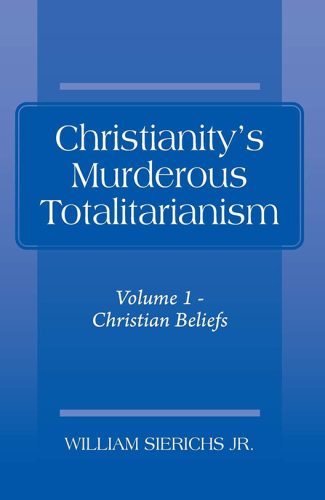
William Sierichs Jr.
About the Book:
This book attempts to explain why Christianity, as a movement, never tolerated dissent, either externally or internally, making it one of the bloodiest forces for totalitarianism in history. Much of the book’s 540,000 words, in two volumes, are quotes from primary sources of Christian history from the 1st to the 21st centuries as well as some scholarly and non-Christian sources, with contextual background information provided where necessary. It lets Christians explain in their own words how the Christian worldview is that the Earth is a cosmic battleground between God and Satan, with every person a soldier of one or the other, so that all non-Christians and the “wrong” kinds of Christians are considered perpetual enemies.
This worldview is illustrated in chapters on Christianity’s paranoid, authoritarian, anti-intellectual, apocalyptic and militant attitudes, the driving forces of Christian violence. It surveys the laws Christian governments used to suppress dissent, quoting many laws from the Roman Empire through Tudor England to the New England Puritans and other Colonial American and post-1776 sources. It reviews how the five attitudes generated hostility and violence against specific groups: The genocidal extermination of European pagans; the kidnappings of American Indian children in the 19th and 20th centuries in Canada and the United States to save them from “heathenism”; the brutal repression of “heresy,” as defined by the Christian majority in any given time and place; the centuries of oppression of Jews by Christian governments; and the horrendous violence and discrimination from the 16th century onward between Protestants and Roman Catholics. One chapter shows how anti-paganism created African slavery and racism in England’s colonies and the United States. This was basically a continuation of the “cleansing” of pagans from Europe, thence carried to the Americas, Africa and Asia. It ends with chapters on the war against church-state separation and “atheism,” as Christians defined it, in the 19th and 20th centuries, including the effects of that conflict on antisemitism, and the very bloody consequences of that war in the 20th century all across Europe. All quotes and other material are footnoted, about 4,500 footnotes, so readers can check the original sources and read more on their own. I am not a professional historian, but I was a reporter or editor on daily newspapers in Louisiana, Mississippi and Texarkana for 40 years before I retired. I used my research, writing and editing skills to create this book, backed by about 30 years of research.
About the Author:
I was a reporter or editor and occasional columnist on several daily newspapers in Louisiana, Mississippi and Arkansas/Texas. I’m a native of Hopewell, Va., and retired in Baton Rouge, La.
